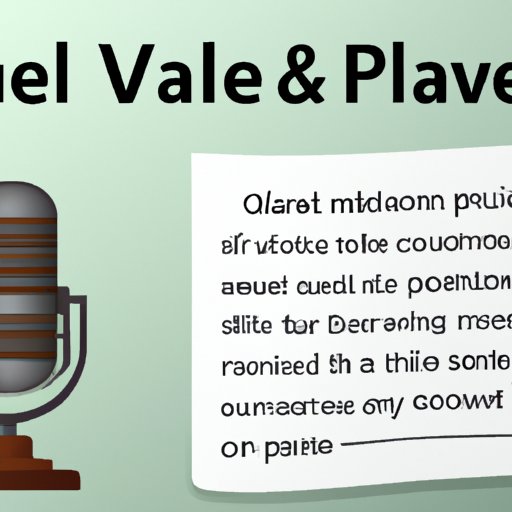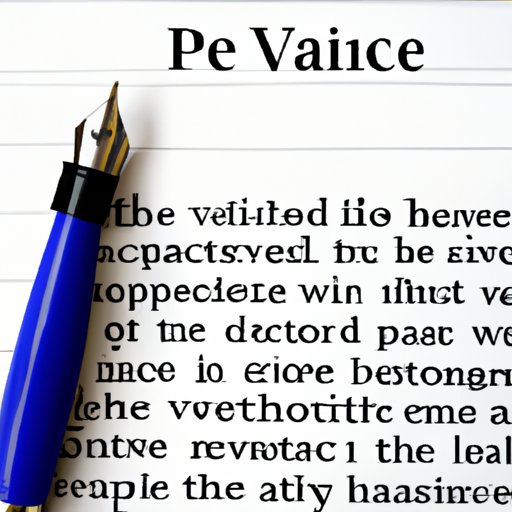Introduction
Legal writing involves crafting precise language that accurately conveys complex ideas and arguments. One of the most important tools for legal writers is the use of passive voice. Passive voice is a grammatical construction in which the subject of a sentence does not perform an action but receives it from another agent. Understanding when and why to use passive voice in legal writing can help lawyers and legal professionals create effective and persuasive documents.

Understanding the Rules for Using Passive Voice in Legal Writing
The rules for using passive voice in legal writing depend on the context. Grammatically speaking, passive voice is formed by using an auxiliary verb, such as “be” or “get,” followed by a past participle. For example, “The document was signed by the parties” is a passive voice construction. It is important to note that passive voice does not always contain a “by” phrase; other constructions, such as “The contract was written,” are also considered passive voice.
In addition to grammatical rules, there are some guidelines for clarity that should be taken into account when using passive voice in legal writing. Generally speaking, passive voice should only be used when the actor is unknown or unimportant. If the actor is known and relevant to the argument, then active voice should be used instead. Additionally, passive voice should not be overused; too much passive voice can make sentences difficult to understand. Finally, it is important to avoid awkward constructions when using passive voice, such as “was being signed” or “were being written.”
For examples of proper usage of passive voice in legal writing, consider the following sentences:
- The documents were signed by both parties.
- The agreement was drafted by the attorney.
- The complaint was filed with the court.

Utilizing Passive Voice in Legal Writing
When using passive voice in legal writing, it is important to keep in mind some strategies for clear communication. First, whenever possible, try to identify the actor in a sentence. Instead of saying “The contract was signed,” for example, say “The parties signed the contract.” This will help keep the focus on the facts and ensure clarity. Additionally, it is important to avoid unnecessary words. For example, instead of saying “The contract was being signed by the parties,” simply say “The parties signed the contract.”
It is also helpful to remember some tips for crafting effective sentences. When writing in passive voice, use precise verbs and avoid adjectives and adverbs. Additionally, be careful not to shift tenses unnecessarily. Finally, make sure to vary your sentence structure. Too many sentences using the same structure can be tedious to read.

Benefits of Using Passive Voice in Legal Writing
Using passive voice in legal writing can provide several benefits. First, it can help improve clarity by keeping the focus on the facts rather than the actors. By removing the actor from a sentence, the reader is able to focus on the action itself. Additionally, using passive voice can help create an emotionally neutral tone, which is important in legal writing. Finally, using passive voice can help keep the reader’s attention on the facts rather than the actors, which can be beneficial in legal arguments.
Pros and Cons of Using Passive Voice in Legal Writing
As with any style of writing, there are advantages and disadvantages to using passive voice in legal writing. On the plus side, using passive voice can help keep the focus on the facts and create an emotionally neutral tone. Additionally, using passive voice can help simplify complex sentences and make them easier to understand. On the downside, using too much passive voice can make sentences difficult to comprehend, and it can also make arguments less persuasive.
Conclusion
Passive voice is an important tool for legal writers. Understanding when and why to use passive voice in legal writing can help lawyers and legal professionals create effective and persuasive documents. By following the rules for proper usage, utilizing strategies for clear communication, and understanding the benefits and drawbacks of using passive voice, legal writers can craft compelling and accurate arguments.
In conclusion, passive voice can be a valuable tool for legal writers, as long as it is used correctly. By understanding the rules and guidelines for using passive voice in legal writing, legal professionals can create clear and persuasive arguments.
(Note: Is this article not meeting your expectations? Do you have knowledge or insights to share? Unlock new opportunities and expand your reach by joining our authors team. Click Registration to join us and share your expertise with our readers.)
